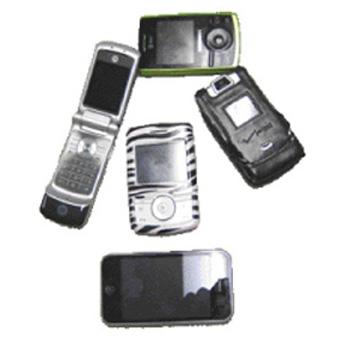LIHU‘E — Barring an unforeseen change of heart from lawmakers or a surprise legal challenge, the Kaua‘i County Council will soon pass a ban on handheld electronics for drivers across the island. The council’s Public Safety/Energy/Intergovernmental Relations Committee unanimously approved
LIHU‘E — Barring an unforeseen change of heart from lawmakers or a surprise legal challenge, the Kaua‘i County Council will soon pass a ban on handheld electronics for drivers across the island.
The council’s Public Safety/Energy/Intergovernmental Relations Committee unanimously approved Bill No. 2336 Wednesday afternoon at the Historic County Building. Assuming the full legislative body does the same as early as next week, the law could go into effect in three months.
Council Chair Bill “Kaipo” Asing and Councilman Tim Bynum, the two ex-officio (non-voting) members of the committee, also signaled their support for the bill, joining with their colleagues to say the law will be an important step forward in providing for the safety of Kaua‘i drivers.
Emergency 911 calls will be allowed, the proposed ordinance says, and emergency responders, drivers using two-way radios for work-related duties and drivers with amateur radio operator licenses issued by the Federal Communications Commission will be exempted.
The bill defines “mobile electronic device” to include cell phones, text messaging devices, pagers, digital assistants, laptop computers, video games and cameras, but does not include audio equipment or navigation systems, or any video systems for passengers in the rear seats.
Before passing the bill out of committee, council members approved an amendment that doubles the maximum fine from $50 to $100 for those drivers convicted or found liable of violating the law while driving in a school zone or construction area.
By means of comparison, a similar ban in the City and County of Honolulu has a maximum fine of $67 for the first offense, and the Big Island’s ordinance, which went into effect this month, charges up to $150 for each violation and up to $500 if the device causes a crash.
A proposal in Maui would implement a fine of no more than $100 for a first offense and no more than $250 for every subsequent offense, according to the Maui News.
Conflicting testimony from two community members did not result in any changes.
Deaf Kaua‘i citizen Larry Littleton, who warned last month that the law would be discriminatory against the hearing impaired, returned to Council Chambers to tell council members they should focus their resources on ocean safety, as drownings have proven to be more deadly than cell phone use.
Littleton’s request that the bill be loosened to create pockets of electronics-free roads, for example near schools, while allowing use elsewhere on the island was not taken up by the council.
Lihu‘e resident Alice Parker, conversely, asked that the council tighten up the bill by banning all electronics use — handheld and otherwise — for drivers.
“Even non-handheld conversation is distracting to drivers as evidenced by AARP’s driving class instructors, who stress that drivers preferably not even engage in conversations with their passengers,” Parker said in prepared testimony.
Committee Chair Derek Kawakami, who had originally introduced the bill at the behest and with the blessing of the Kaua‘i Police Department, said while all electronics use could be distracting, it would present enforcement problems to ban all conversations.
The bill defines “use or using” as “holding a mobile electronic device while operating a motor vehicle.”
Specific references to hands-free devices were excluded from the legislation because Kawakami did not want the bill to be used as an endorsement for a technology that may or may not be less dangerous than hand-held electronic devices.
The vote came one day after U.S. Transportation Secretary Ray LaHood and the National Safety Council announced FocusDriven, an advocacy group to raise awareness and support victims of distracted driving.
For more information, visit www.distraction.gov, www.nsc.org and www.focusdriven.org.


